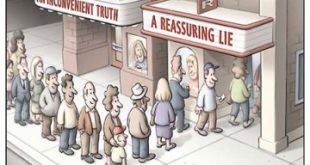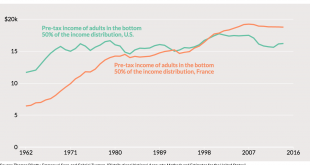from Asad Zaman Goethe starts his famous East-West Divan with a poem about the journey (Hegire), both physical and spiritual, from the West to the East. In this essay, we consider the analogous journey from Western to Eastern conceptions of development. This involves switching from viewing humans as producers of wealth, to viewing wealth as a producer of human development. To start with the Western conceptions, both Adam Smith and Karl Marx defined economic growth as the process of...
Read More »Mainstream economics — an emperor turned out to be naked
from Lars Syll The main reason why the teaching of microeconomics (or of “ micro foundations” of macroeconomics) has been called “autistic” is because it is increasingly impossible to discuss real-world economic questions with microeconomists – and with almost all neoclassical theorists. They are trapped in their system, and don’t in fact care about the outside world any more. If you consult any microeconomic textbook, it is full of maths (e.g. Kreps or Mas-Colell, Whinston and Green) or...
Read More »Risk vs. arrogance
from David Ruccio Most of us are pretty cautious when it comes to spending our money. The amount of money we have is pretty small—and the global economic, financial, and political landscape is pretty shaky right now. And even if we’re not cautious, if we’re not prudent savers, then no harm done. Spending everything we have may be a personal risk but it doesn’t do any social harm. It’s different, however, for the global rich. The individual decisions they make do, in fact, have social...
Read More »A tax on Wall Street trading is the best solution to income inequality
from Dean Baker In the years since the 2008 economic crisis, financial transactions taxes (FTTs) have gone from a fringe idea to a policy that is in mainstream policy debates. They are seen as a way to both raise large amounts of money and to slow the pace of churning in financial markets. For this reason, most progressive Democrats have come out in support, and even the Clinton campaign provided a hat-tip to some form of taxation on high frequency trading. This is a welcome change from...
Read More »Equilibrium: a weed to pull
from Peter Radford Just how pejorative must we be in order to get attention? There are silly things in economics that need to be weeded out, so that something better can emerge. Sometimes I just say the whole thing is a waste of time, after all economics is not simply a body of thought, but it is also a social phenomenon, it has its own language, its own self-referential estimate of quality, its own hierarchy, and its own history that locks it tightly along a specific path. And, frankly,...
Read More »Comparing income inequality in the United States and France
The bottom 50 percent of income earners makes more in France than in the United States even though average income per adult is still 35 percent lower in France than in the United States (partly due to differences in standard working hours in the two countries).9 Since the welfare state is more generous in France, the gap between the bottom 50 percent of income earners in France and the United States would be even greater after taxes and transfers. The diverging trends in the...
Read More »Formal mathematical modeling in economics — a dead-end
from Lars Syll Using formal mathematical modeling, mainstream economists sure can guarantee that the conclusions hold given the assumptions. However, the validity we get in abstract model worlds does not warrantly transfer to real world economies. Validity may be good, but it isn’t enough. From a realist perspective both relevance and soundness are sine qua non. In their search for validity, rigour and precision, mainstream macro modellers of various ilks construct microfounded DSGE...
Read More »Late capitalism?
from David Ruccio Apparently, “late capitalism” is the term that is being widely used to capture and make sense of the irrational and increasingly grotesque features of contemporary economy and society. There’s even a recent novel, A Young Man’s Guide to Late Capitalism, by Peter Mountford. A reader [ht: ra] wrote in wanting to know what I thought about the label, which is admirably surveyed and discussed in a recent Atlantic article by Anne Lowrey. I’ll admit, I’m suspicious of “late...
Read More »Bundesbank rejects 100%-money based on sophistry and false claims
from Norbert Häring In its April monthly report, Deutsche Bundesbank explains that banks create money ex-nihilo and rejects the proposal of 100%-money. The full English version is now online. The arguments employed to discredit 100%-money are a mix of sophistry and misleading or false statements. With some delay, Bundesbank has joined the Bank of England in explicitly stating that the treatment of banks and money creation in most textbooks is wrong and that banks are not intermediaries,...
Read More »Trump family and friends: in your pockets
from Dean Baker Donald Trump has openly said that he doesn’t care at all about the rules that prohibit the president and those around him from profiting from their government positions. In breaking with longstanding precedent, he is holding on to his business empire and having his children run it as he carries on with the business of being president. With the government forced to pay the bills for the Secret Service to stay at his golf resorts and hotels, Trump obviously feels no...
Read More » Real-World Economics Review
Real-World Economics Review





